Wellness trends in recent years have been seriously focused on hemp oil and CBD. While both have been around in holistic medicine for centuries, they are seeing a revival due to recent changes in their legal status. Now pet owners are starting to recognize the potential benefits of these two wonder oils.
However, there is still much confusion surrounding what precisely each of these products is, the differences between the two, and how they might affect dogs. Here we will provide an overview and compare hemp oil vs CBD oil for dogs to help you to identify which might be the best for your furry friend.
Hemp Oil and Its Benefits
Praised as a superfood, hemp oil, otherwise known as hemp seed oil, is popular both as a supplement and as a skincare product. It offers a significant number of health advantages for people and dogs alike, such as helping with skin issues, digestive problems, joint pain, and for boosting cardiovascular health and general wellbeing.
CBD Oil and Its Benefits
CBD or cannabidiol is a relatively new ingredient to many consumers. However, early research indicates many surprising benefits of this unique supplement for both us and our lovely pets. These include relief from aches and pains associated with aging and/or surgery and a reduction in common symptoms of stress and anxiety.
Hemp Oil vs CBD Oil for Dogs: 6 Key Questions
Chatting to your doggy buddies may have turned you on to hemp or CBD oil as something that could calm your new pup or help them deal with stressful situations. Alternatively, you might have heard about people using these supplements to improve their older dog’s mobility, appetite, and energy levels. However, you may be worried about using products associated with recreational drug use on your fur-baby, especially if they are illegal…
Fear not! We are here to put your mind at ease by addressing some of your most pressing concerns about hemp and CBD:
What are these oils, and where do they come from?
The terms hemp and CBD are often used interchangeably to the point where many believe there to be no distinction between the two. However, there is a big difference both in terms of the origin and composition of the oils.
The cannabis plant, also referred to as hemp, is the origin of both oils and marijuana, too. This is where the confusion begins. Marijuana and CBD oil are both produced from the leaves, flowers, and stalks of the plant. They contain a multitude of different compounds or ‘cannabinoids’ that have many health benefits.

Hemp oil, or hemp seed oil, as it’s otherwise known, is a cold-pressed extract from the seeds of the same plant. As a seed oil, it is high in beneficial nutrients such as antioxidants and both Omega-3 and Omega-6 fatty acids.
While hemp seed oil is legal everywhere and approved for use by the FDA, marijuana is not. The main reason for this is the presence of tetrahydrocannabinol (THC). This is the chemical responsible for the high that recreational users of marijuana experience.
CBD oil falls into somewhat of a grey area due to the fact that some versions have THC while others don’t. Technically speaking, CBD oil should contain no more than 0.3% of this psychoactive compound. That certainly needs to be the case if you are hoping to give it to your dog.
How are the oils extracted?
Naturally, getting these two different oils from the plant in question differs somewhat. With each type, there are a variety of methods used – some better for potency and others for price.
CBD oil can be extracted in one of the following ways:
Using Solvents: The plant is soaked in food-grade ethanol, butane, or propane to draw out the desirable compounds, and then the mixture is refined. This is a relatively cheap extraction method that requires no specialist equipment. Still, if it is not done carefully, solvents can remain.
Using Olive Oil: This is carried out in much in the same way, but the raw hemp is heated first. This option is also one of the cheaper ones, but the final product is less concentrated and will likely not taste as good.
Steam Distillation: Another popular method is to free the cannabinoids from the raw plant material using steam. The resulting vapor is then cooled and condensed. Again, this method is cheap and cheerful, but the end result contains inconsistent concentrations of CBD.
CO2 Extraction: With this technique, carbon dioxide is used to remove the compounds from the plant materials. First, the gas is converted to somewhere between a liquid and gaseous state through pressure and temperature adjustments. It is then passed through the hemp, drawing out the oil. Finally, the CO2 evaporates and leaves behind a pure and potent form of CBD. This method is safe, environmentally friendly and effective, but requires the use of more sophisticated, expensive equipment.
Hemp seed oil is extracted through the use of a press
The raw seeds are placed into a container and crushed until the oil runs out the bottom. Variables on the quantity and quality of the oil come from how the seeds are stored prior to pressing as well as the temperature during pressing. Cold-pressed oil is preferred even though not as much of it is produced per seed batch. More of the seed oil’s nutritional benefits are retained this way, and it tastes better.
What compounds are in each, and what do they do?
Many CBD oil users become bogged down with the CBD and THC concentrations – and for good reason, but let us not forget about all the other incredibly healthful compounds produced by the cannabis plant. Researchers have identified several other beneficial cannabinoids. These include:
- Cannabinol (CBN) – this is said to ease the symptoms and side effects of a range of neurological conditions such as epilepsy and seizures.
- Tetrahydrocannabinol acid (THCA) – while similar to the much-debated THC, THCA doesn’t have any of the psychoactive effects. However, potential benefits for canines include relief from pain and soreness brought about by inflammation, as in the case of arthritis.
- Cannabigerol (CBG) – this helpful chemical is suggested to help those who suffer from symptoms of stress, anxiety, and even depression.
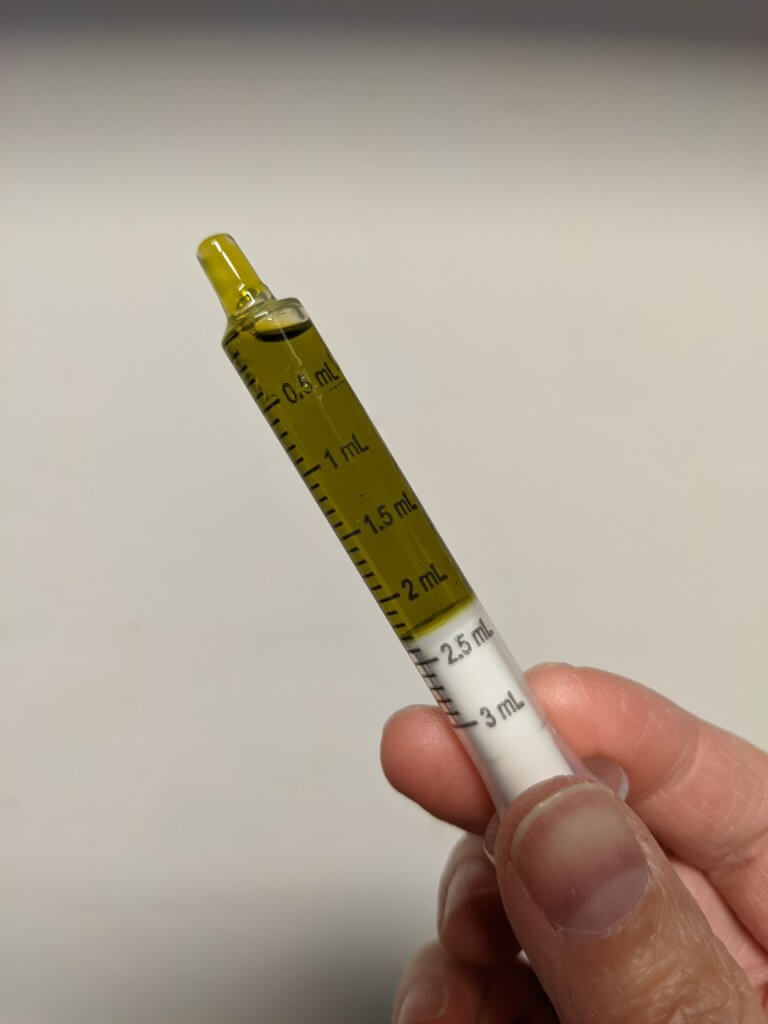
Cannabis plants also contain more than 100 varieties of another form of naturally occurring compound called terpenes. There has been much less focus on these. However, experts suggest they may be just as impactful as cannabinoids.
Hemp seed oil, on the other hand, does not contain any of the cannabinoids or terpenes of CBD oil. Its benefits lie in its rich nutritional profile of fatty acids and useful bioactive compounds. These mostly help counteract dietary deficiencies and boost overall health and wellbeing.
Are CBD oil and hemp oil safe for dogs?
Both hemp seed oil and CBD oil have been shown to be incredibly safe for dogs when owners keep to the recommended amounts (source).
Three minor side effects encountered in humans are that may also be present in dogs are:
- Dry mouth and increased thirst.
- Lowered blood pressure which could result in some mild light-headedness.
- Drowsiness – this is especially the case with higher dosages.
How effective are they at treating pain?
CBD oil acts as an analgesic and anti-inflammatory. It can provide relief to muscle aches, joint problems, and headaches in people. Research now suggests that it could have many of the same benefits for dogs, too.
Early studies also indicate that CBD may be effective in helping dogs who suffer from seizures. This is excellent news because drugs currently used for dealing with this issue, which approximately 5% of dogs suffer from, have all sorts of nasty side effects and don’t work in all cases.
Likewise, hemp seed oil’s rich omega fatty acid content also makes it effective at reducing the intensity of joint problems, including swelling, tenderness, and discomfort that may be present in older dogs.
How effective are they at treating anxiety?
The same polyunsaturated omega-3 fatty acids in hemp seed oil that help with pain and inflammation can also help reduce symptoms of anxiety by maintaining proper homeostasis – balance within the brain.
CBD oil is also starting to show some promising results in this area. While studies on CBD use for canines are in their infancy, plenty of anecdotal evidence suggests that this all-natural product has calming properties that can help pups that suffer from separation anxiety or are afraid of loud noises or unfamiliar situations.
The way that it does this is through the different compounds binding with various receptors in the endocannabinoid system of canines in a manner similar to how they do in humans. This ‘bridge between body and mind’ plays a vital role in mood, sleep, and appetite, among other things.
Moreover, the additional cannabinoids and terpenes present in CBD oil create something known as an ‘entourage effect’ – essentially boosting its potency and effectiveness.
Details of Use
Now you know precisely what each of these products is and what to look out for, let’s consider how they should be used for dogs.
Dosage Guidelines
For hemp seed oil, around 1 tsp per 1.2 pounds of food with a non-chicken-based diet is a good amount.
The reason no chicken is suggested is due to the fact that it contains similar fats to hemp seed oil, and you wouldn’t want to overdo things.
With CBD, dosage information is a little less clear as the FDA is yet to approve its use. However, experts who have conducted research with canines suggest the following amounts as being both effective and side-effect free.
Details are based on the weight of your pup.
- 10 pounds: 1 mg – 5 mg
- 20 pounds: 2 mg – 10 mg
- 30 pounds: 3 mg – 15 mg
- 40 pounds: 4 mg – 20 mg
- 50 pounds: 5 mg – 25 mg
- 60 pounds: 6 mg – 30 mg
- 70 pounds: 7 mg – 35 mg
- 80 pounds: 8 mg – 40 mg
- 90 pounds: 9 mg – 45 mg
Depending on what form you are administering the oil: tinctures, liquid, or treats, as well as the intended effects of the oil, amounts might vary. However, this information should be provided on the packaging or on the manufacturer’s website.
Speed of Impact
With hemp seed oil, you are likely to notice more of a cumulative effect, but with CBD, you could see results in as little as 30 minutes. However, this all depends on factors such as the size of your dog, the potency of the oil/treat, the condition you are treating, and its severity. Quickest results will be found from selecting the highest strength possible for your dog’s size and administering it in as close to its original form as possible, directly into their mouth.
However, this is not always possible or, in fact, recommended.
Generally speaking, you want to use a lower dose for wellbeing and treating anxiety and a higher one for pain and medical issues. It’s suggested that you always start with the lowest dose first and see if that helps. Keep in mind that ongoing use of CBD also increases its effectiveness.
Best CBD Oil for Dogs
This full-spectrum oil, containing all the beneficial compounds found in the cannabis plant, is combined with MCT oil for rapid metabolism of the CBD. This helps it to maintain a higher percentage of its original potency. The human-grade formula is lab-tested to ensure its quality of effectiveness – results can be found on the Chill Paws website.
Chill Paws 500 MG Full Spectrum CBD Oil for Dogs
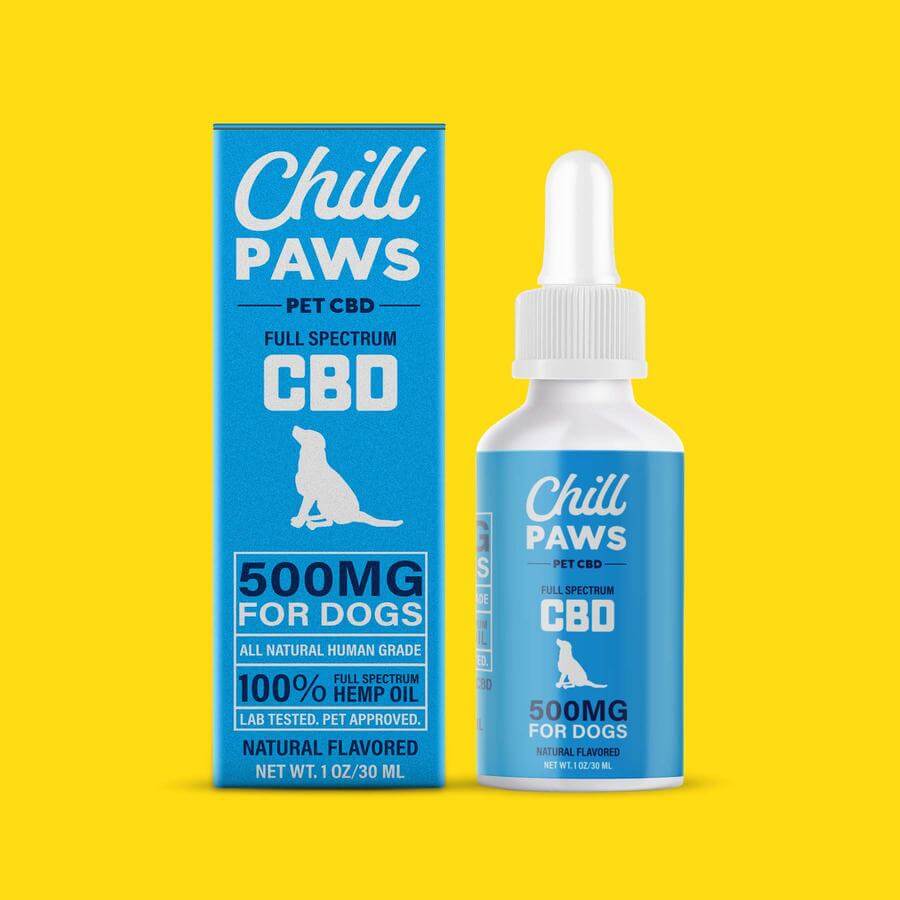
According to numerous reviews, this product is excellent for both pain and anxiety. Reviewers comment that the product “definitely works” and that it has been “a huge help” with various symptoms. Some mention that it can be a little tricky to get their pup to actually ingest the oil – this is where CBD treats may be a useful alternative.
If you’re looking to purchase this product, just make sure that you get the correct strength for your dog’s size and follow the dosage information provided very carefully to ensure that you don’t give your pal too much of the good stuff.
Best Hemp Oil for Dogs
Formulated to reduce stress and promote feelings of relaxation for both dogs and cats, these handy calming drops utilize hemp seed oil alongside other powerful mood-balancing ingredients. They are aimed at helping pets cope with everyday stressful situations such as fireworks, thunderstorms, and being left home alone. The addition of ginger also makes them ideal for travel.
NaturVet Hemp Quiet Moments Calming Drops Hemp Oil
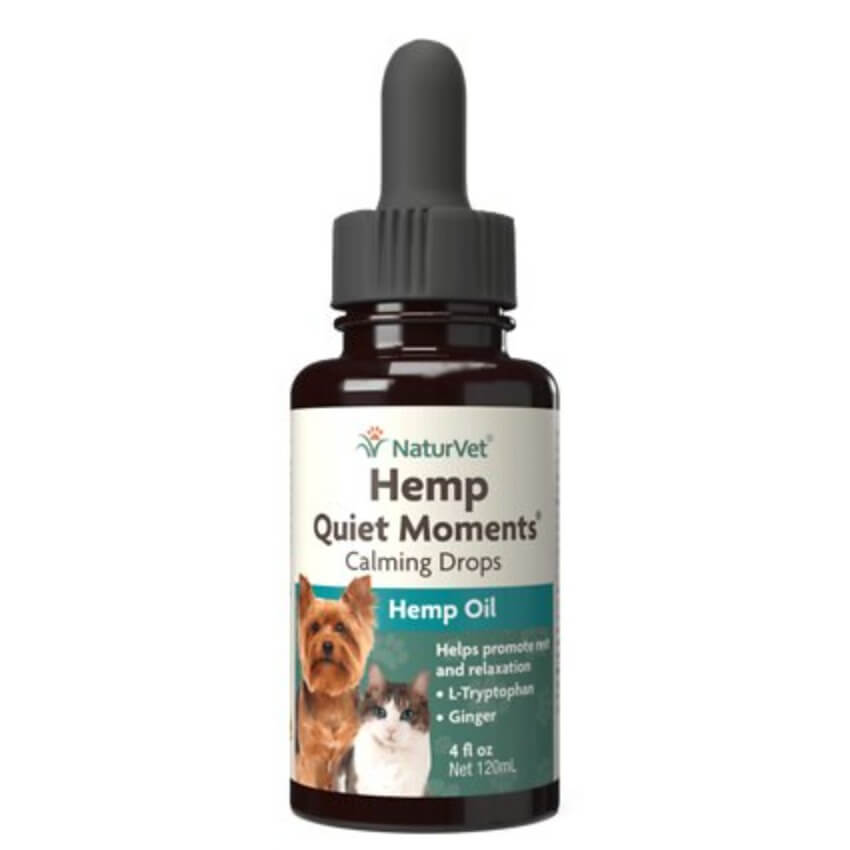
Again, customers have purchased this product both for anxiety and pain relief for their pups. Reviewers report a reduction in aggressive behaviors towards strangers, easier vet visits, and improved sleep quality for their pets, among other things. However, there are a few negative comments, with some people talking about how it didn’t work for their dog.
This could be an issue with user expectations due to confusion between CBD and hemp seed oil. While effects are seen relatively quickly with CBD, they tend to be more cumulative with hemp seed oil, requiring daily dosages for a few days to weeks.
Best Combined Product
This fab oil offers the best of both worlds by combining CBD with hemp seed and even krill – another excellent source of healthy fats, for a “more potent and soothing effect.” While the CBD is broad-spectrum rather than full-spectrum, meaning that it may not have quite as many cannabinoids as the Chill Paws oil, this also means that it also has absolutely no THC.
King Kanine KING KALM CBD 150mg
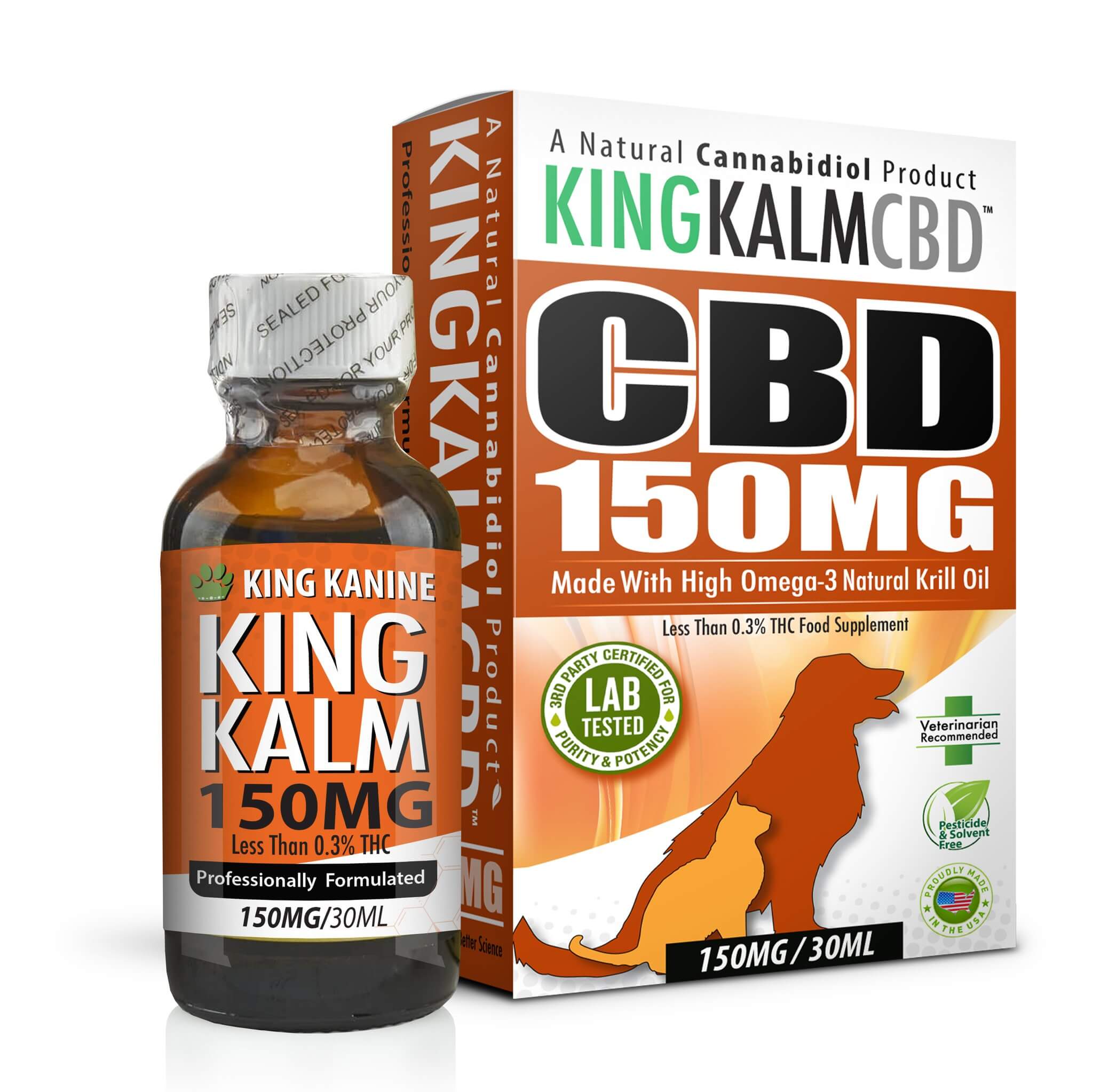
Reviewers seem impressed, although the website’s set up makes it tricky to ascertain whether the comments are about this product specifically. Either way, it’s clear to see that customers really trust this brand, and their pets have certainly benefited from the products they have bought from them. The evidence is certainly on the side of showing that this oil is likely to be effective for many pups.
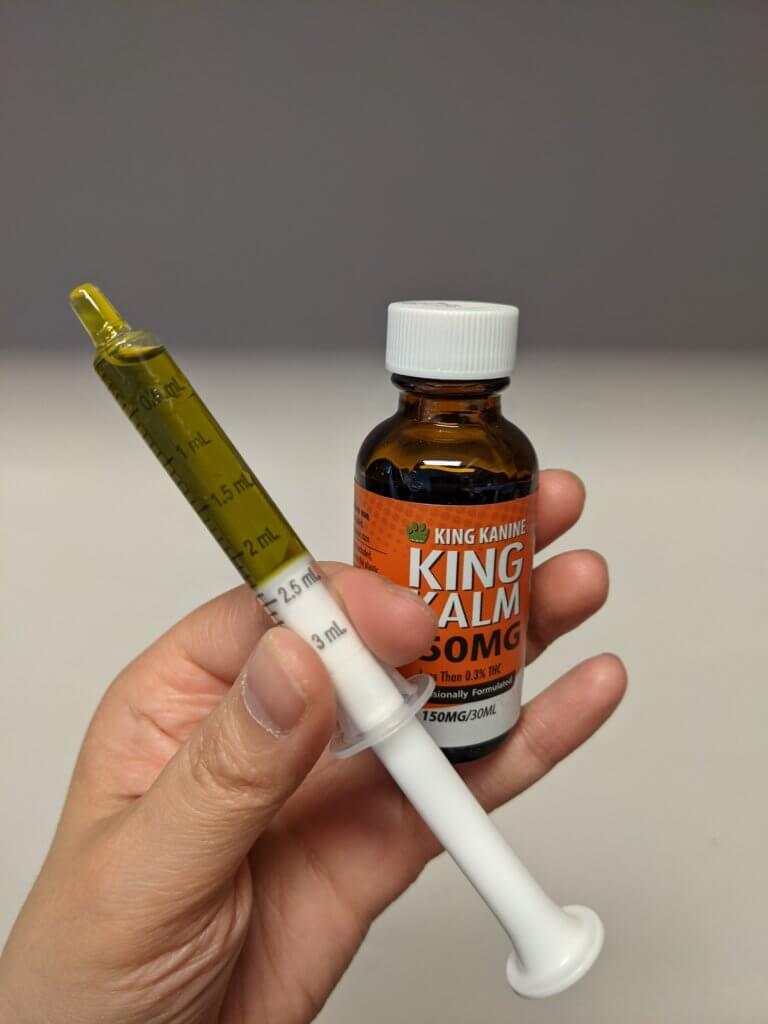
Hemp Oil vs CBD Oil for Dogs: The Final Verdict
While both hemp oil and CBD oil are derived from the same plant, the benefits are significantly different. This is to do with the individual makeup of the oils, including the compounds they contain and how these interact with the body.
While hemp seed oil may be considered more a dietary supplement, dog owners have seen good results with this ingredient for mobility issues with elderly dogs, calming during stressful situations, and overall health maintenance. Admittedly a little more patience is required to see such benefits, though.
CBD oil, on the other hand, seems to be more fast-acting and potentially more powerful. As such, this might be your best option for more severe problems. Although there are potential issues here with the composition of the product and how the oil is extracted. You need to be sure that you can trust the manufacturer.
Either way, with ‘hemp oil’ being used as a generic term for both products, the only way you can be truly sure of what you’re getting is to check the ingredients. Hemp seed oil should be listed as that or as cannabis sativa seed oil, while CBD could come under cannabidiol, full-spectrum hemp, hemp oil, PCR (phytocannabinoid-rich), or PCR hemp extracts. If in doubt, make sure that you ask.
Learn How to Care for Your Doodle Puppy!

Perfect for first-time Doodle parents, get ALL your questions answered, including questions new Doodle parents don’t even think to ask.
Plus, get $700 worth of Bonus Materials for FREE, including:- Doodle Parenthood Community and Support Group ($190 value)
- Doodle Puppy Growth Tracker ($20 value)
- EMERGENCY Cheatsheet: When To Call The Vet Immediately ($50 value)
- HELP! Button ($145 value)
- And SO MUCH MORE!
The information on this page is for informational purposes only. It is not intended to be a substitute for qualified professional veterinary advice, diagnosis, or treatment. Always seek the advice of your veterinarian or other qualified animal health provider with any questions you may have.

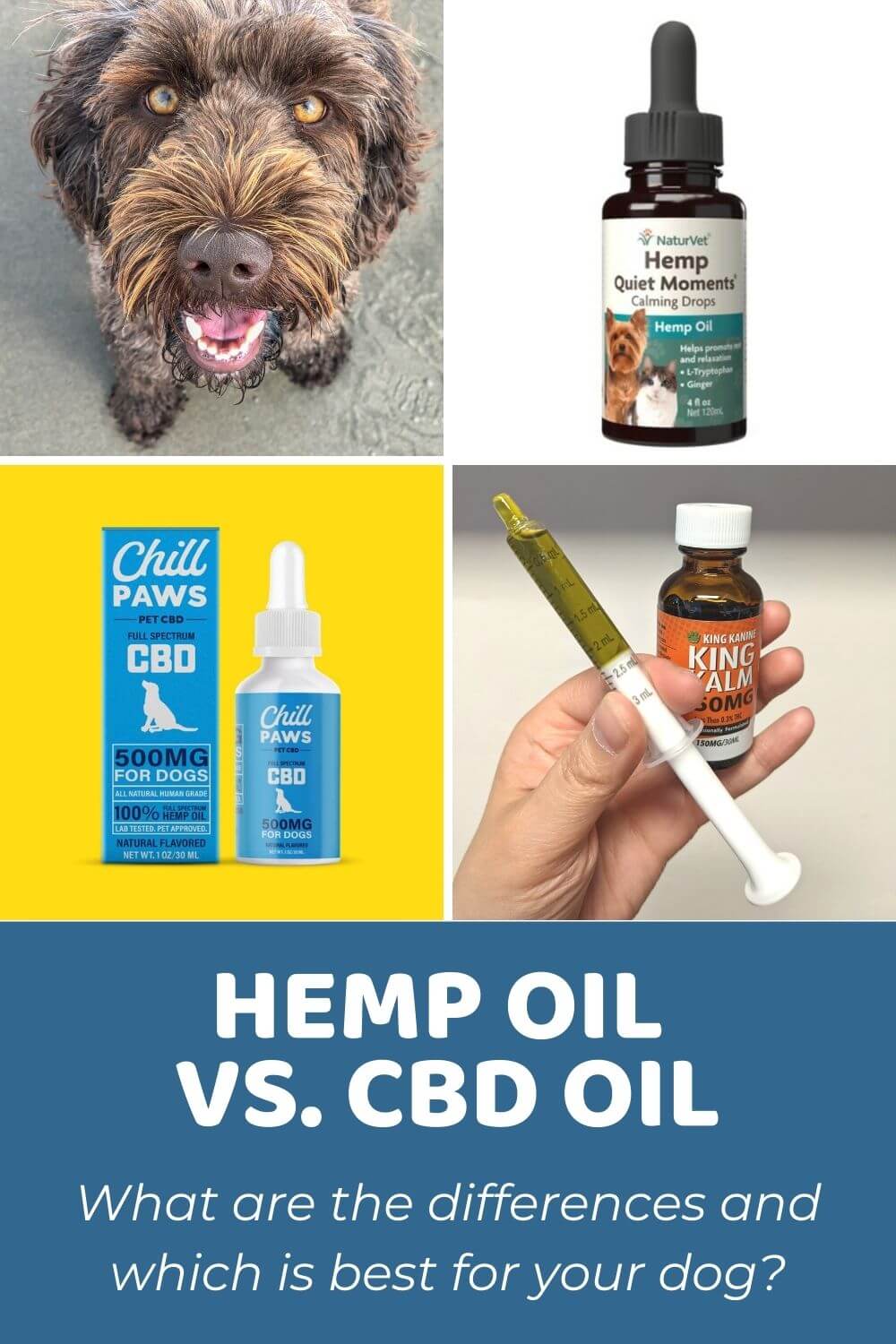
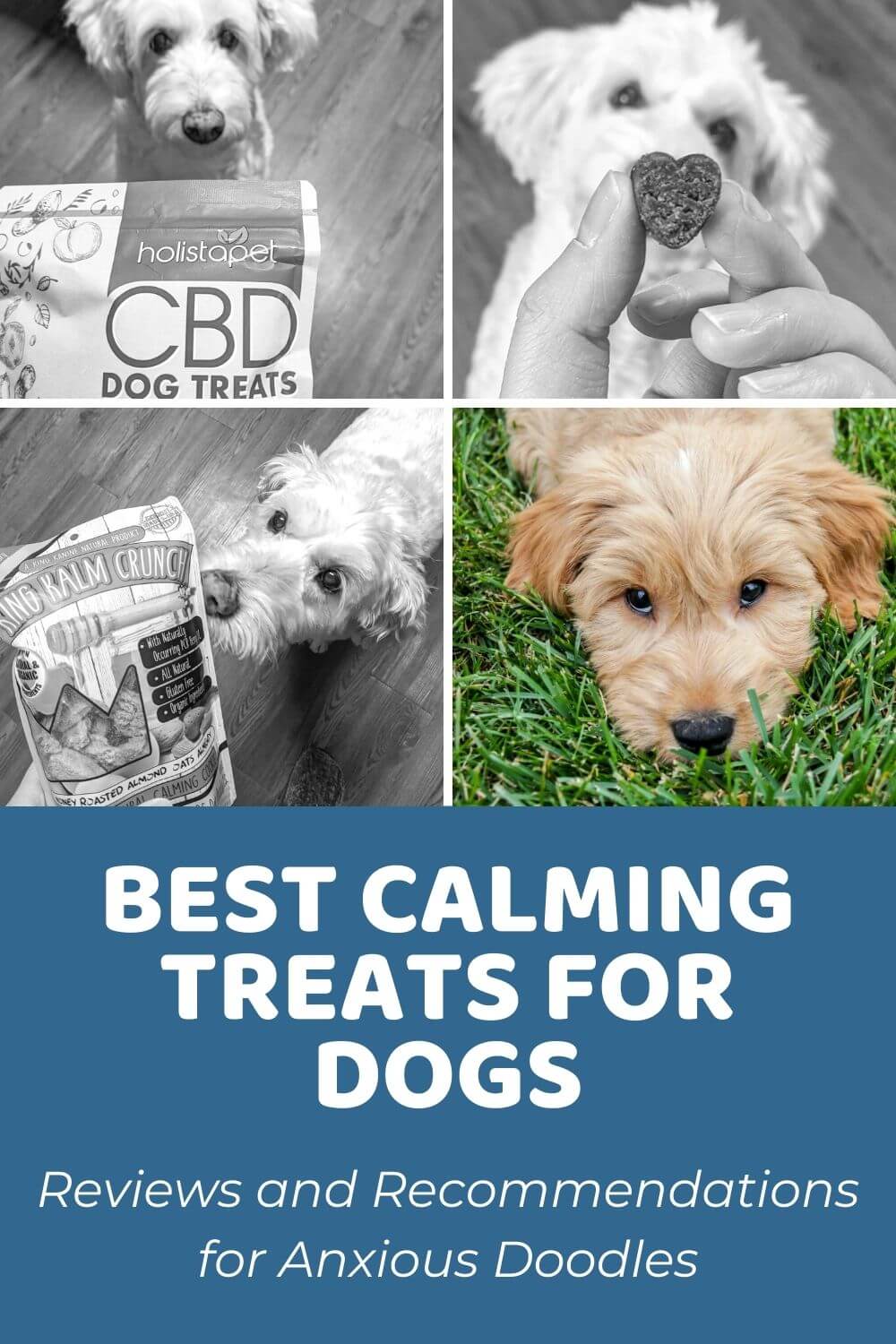
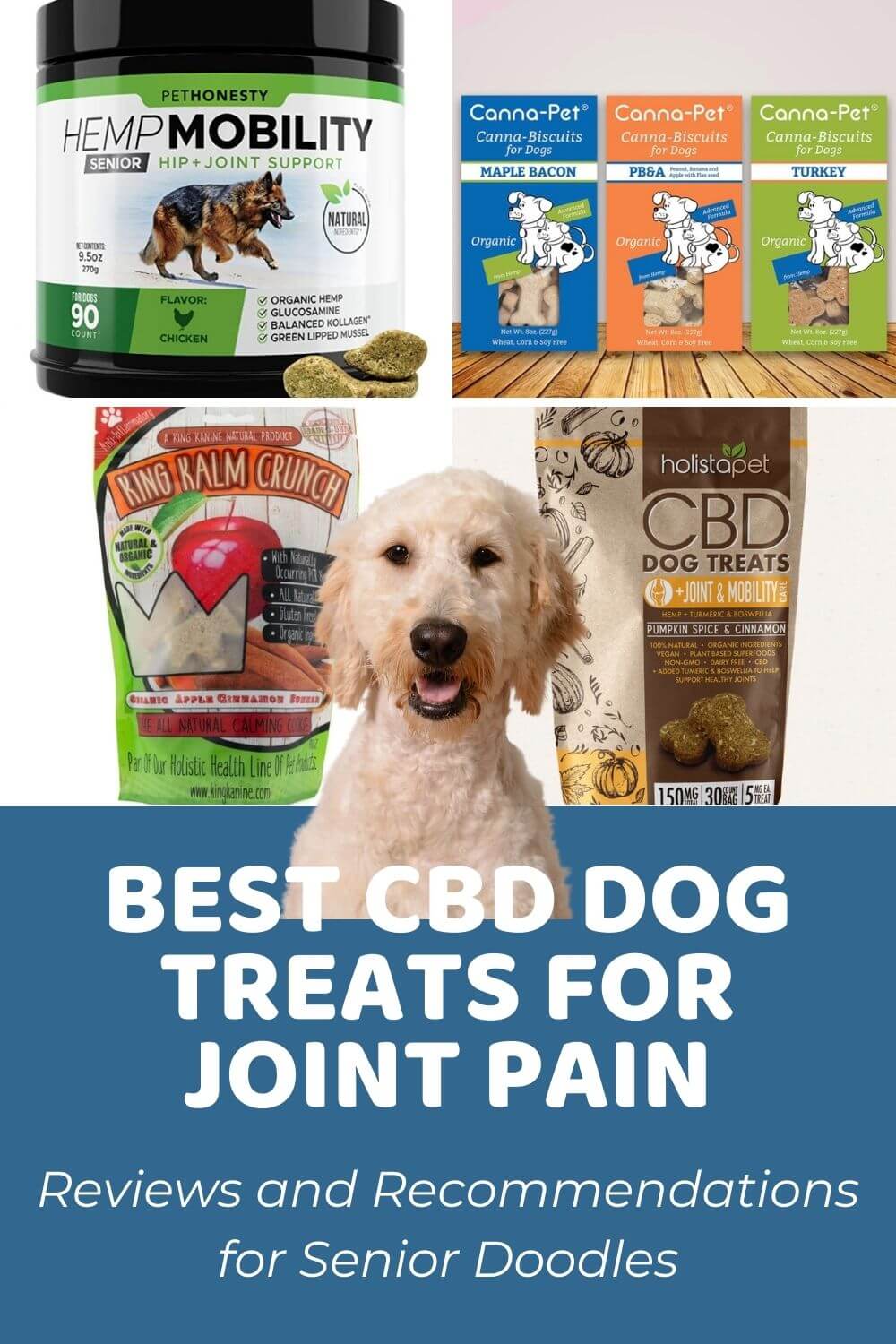
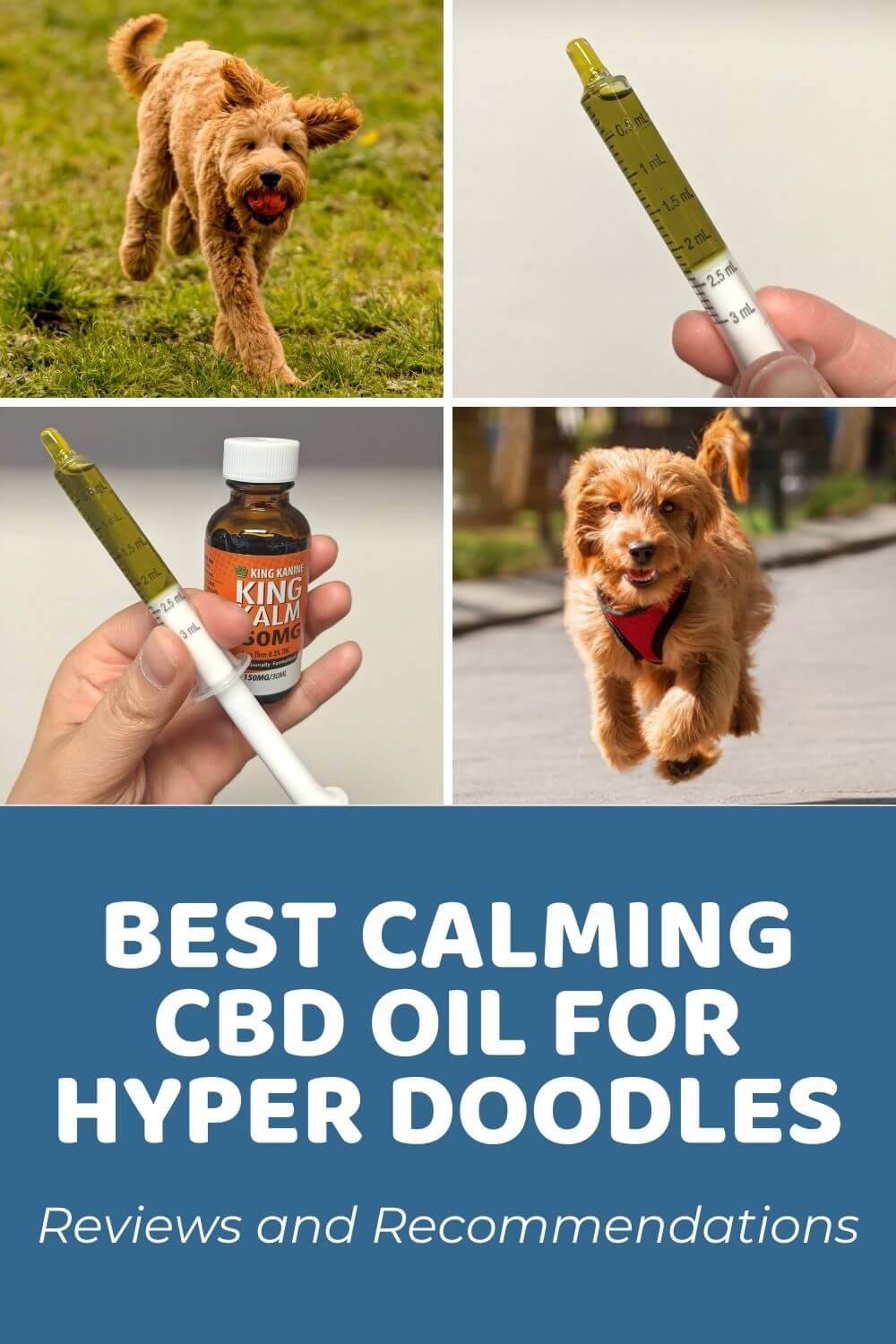
Has your dog tried CBD or hemp oil for certain issues? Let us know how it worked in the comments below.